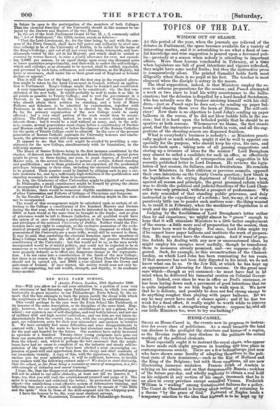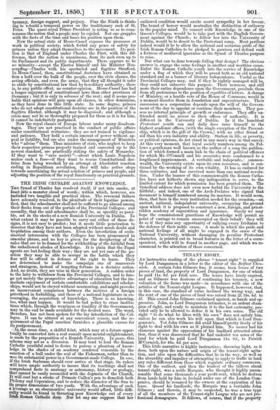B:ESSF-CASSEL.
SMALL as Hesse-Cassel is, the events now in progress -re instruc- tive for every class of politicians. As a small bread-in the land
can disclose to the geologist the structure and histor of a region, so the Hessian rupture may disclose to the politioin the actual working of the political elements.
Most especially ought it to instruct the royal chaos, who appear to have made such slight progress in learning Oir true place in contemporaneous society. There are a few beforegurope just now who have shown same faculty of adapting therfelves to the poli- tical state of their dominions,—such as the Rig of Holland and the Ring of the Belgians but with those exce)tions, all are now illustrating immense mistakes. Francis j,eph of Austria is relying on his armies, and on that dangerourilly Russia; reckless of the future pay-day, and wholly neglectig to obtain a real hold on his subjects in any section of his empi39 insomuch that he is an alien in every province except unnattaal 'Vienna. Frederick William is "wading" among tentativesind failures for a policy. The Count de Chambord is keeping aliven notion of returning to a throne "by the grace of God." FeAnand of Naples lends a temporary sanction to the idea that kiscraft is to be kept up by tyranny, foreign support, and perjury. Pius the Ninth is think- ing to rebuild a temporal power on the traditionary rook of St. Peter. The quasi-royal Prince President is acting so as to coun- tenance the notion that a people may be cajoled. Not one grapples with the facts of the time and bases his position upon them. Now the actual state of Hesse-Cassel exposes the processes at work in political society, which forbid any peace or safety for princes unless they adapt themselves to the movement. Its posi- tion is that of Fngland under Charles the First, with this dif- ference, that the nation is unanimous, from its mob even up to its Parliament and its public departments. There appears to be no minority—except the Elector himself and his Minister Has- senp4ing—Charles with his spectacled and fugitive Strafford. In Hesse-Cassel, then constitutional doctrines have obtained so firm a hold over the bulk of the people, over the civic classes, the acting officials, and even the army, that they all thought it safer to abide by constitutional law than by hereditary authority ; there is, to any public effect, no counter-opinion. Hesse-Cassel has had a longer enjoyment of constitutional laws than other provinces of Germany ; but it is only in advance of the rest; and it seems pro- bable that opinions will gain upon all classes, in other dominions, as they have done in this little state. In some degree, princes who do not adopt constitutional doctrine are in the position of the fugitive Elector, although it may be disguised; and although a crisis may not be so thoroughly prepared for them as it is for him, it cannot be indefinitely postponed. Now the royal classes of Europe labour under many disadvan- tages. They are not practised in the conduct of public affitirs under constitutional restraints ; they are not trained to vigilance and patience. They hold a certain amount of power without ap- peal or liability, but are also under the management of Ministers who " advise " them. Thus ministers of state, who neglect to keep their respective princes properly trained and corrected up to the newest standard, are practically risking the safety of Monarchy. If they want to "save society "—about which Louis Napoleon makes such a fuss—if they want to rescue Constitutional doc- trine from being wrecked by an attempt at Absolutist reaction ending in Republican revolution, they -will take active steps towards ascertaining the actual relation of princes and people, and adjusting the position of the royal functionary on practical grounds.



























 Previous page
Previous page